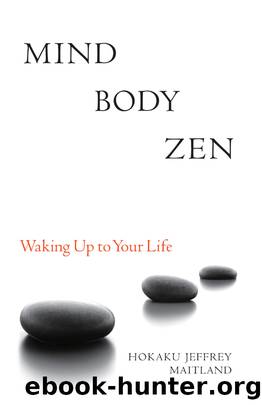Mind Body Zen by Jeffrey Maitland

Author:Jeffrey Maitland [Maitland, Jeffrey]
Language: eng
Format: epub
ISBN: 978-1-58394-471-4
Publisher: North Atlantic Books
Published: 2011-08-30T00:00:00+00:00
The Zen way of thinking and asking questions is radically different from how we ordinarily ask about the nature of reality. Almost every theological, philosophical, or scientific inquiry is already an investigation that begins after subject and object, self and world, past, present, and future appears. It is the suffering self or the curious self, after all, that wants to know the meaning of life or how the world works. But this everyday way of asking about reality takes place in a world where subject and object are experienced as already separate. In contrast, Buddhism wants to know about the nature of reality before subject and object arise. But how is this kind of query even possible? How can the self-encumbered mind investigate the unification from which it and its world arise, when experiencing this unification requires the dissolution of the very self that wants to know?
This paradox of knowing arises because our everyday experience is dominated by a kind of self-possession that is attached to itself as its own foundation and a way of knowing that objectifies and distances itself from what it knows. Typically, our experience and perception are so thoroughly saturated with an âI amâ that we ceaselessly outshine the profound significance of our own continual dissolution and resurrection. The I-am-self we mistakenly live and accept as our essential nature is also necessarily caught up in metaphysical ways of thinking that reflect its particular fixation of self-possession. More often than not, we are so convinced that our self-possession is our essential foundation that we believe ourselves to be some sort of eternal soul/mind utterly different from our bodies.
When he first began koan study, a Zen student asked Roshi, âEven if I know that I donât have the answer and you know that I donât have the answer and I know that you know that I donât have the answer, should I still try to give an answer?â Without hesitation, Roshi emphatically said, âYes!â
A few sesshins later the student got stuck trying to answer his koan. He had tried everything he could think of and was completely out of answers. He knew that a verbal answer would be instantly rejected, but that was the only kind of answer he could come up with. At the same time, he just couldnât face Roshi and say he had no answer whatsoever. So he decided to give his verbal answer. When he sat before Roshi to answer his koan he said, âI embrace the whole cosmos as myself,â and made a gesture of embracing everything. Roshi immediately exclaimed, âSchoolboy Zen!â and rang the bell, dismissing the student.
Download
This site does not store any files on its server. We only index and link to content provided by other sites. Please contact the content providers to delete copyright contents if any and email us, we'll remove relevant links or contents immediately.
The Way of Zen by Alan W. Watts(6594)
Ego Is the Enemy by Ryan Holiday(5412)
The Art of Happiness by The Dalai Lama(4120)
The Book of Joy by Dalai Lama(3969)
Why Buddhism is True by Robert Wright(3446)
Spark Joy by Marie Kondo(3296)
Shift into Freedom by Loch Kelly(3192)
Happiness by Matthieu Ricard(3039)
A Monk's Guide to a Clean House and Mind by Shoukei Matsumoto(2901)
The Lost Art of Good Conversation by Sakyong Mipham(2638)
The Meaning of the Library by unknow(2563)
The Unfettered Mind: Writings from a Zen Master to a Master Swordsman by Takuan Soho(2294)
The Third Eye by T. Lobsang Rampa(2256)
Anthology by T J(2204)
Red Shambhala by Andrei Znamenski(2191)
The Diamond Cutter by Geshe Michael Roach(2058)
Thoughts Without A Thinker: Psychotherapy from a Buddhist Perspective by Epstein Mark(2009)
Twilight of Idols and Anti-Christ by Friedrich Nietzsche(1888)
Advice Not Given by Mark Epstein(1877)
